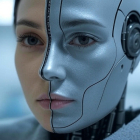As automation and artificial intelligence accelerate, the global workforce faces a fundamental shift. From factory lines to finance desks, machines are rapidly replacing human labor in ways unimaginable just a few decades ago. While this technological evolution promises increased productivity and economic growth, it also raises serious concerns about job security, income inequality, and social cohesion.
Universal Basic Income (UBI)—a model where all citizens receive a regular, unconditional payment—has emerged as one of the most compelling solutions to these challenges. Far from being a utopian fantasy, UBI could become a practical policy tool to ensure that humans thrive, not just survive, in a world dominated by machines.
Here are 15 compelling reasons why UBI could be key to empowering workers in an automated future:
✅ 1. Stabilizes Income as Jobs Disappear
As automation makes some jobs obsolete, UBI offers a way to prevent millions from falling into poverty. Rather than leaving individuals at the mercy of a volatile job market, it provides a predictable baseline income to cover essentials like housing, food, and healthcare. This kind of financial stability is crucial in a future where job security is increasingly rare.
UBI acts as an economic anchor during technological upheaval, ensuring that people aren’t punished for economic changes beyond their control. It gives everyone the breathing room needed to adapt, transition, and survive—even when their old roles vanish.
✅ 2. Encourages Entrepreneurship
When people are no longer paralyzed by the fear of losing everything, they become more willing to take risks. UBI empowers individuals to start businesses, try freelancing, or pursue passion projects they previously couldn’t afford. It reduces the opportunity cost of failure and makes innovation more accessible to people from all backgrounds.
Rather than relying on inherited wealth or venture capital, even someone with no financial safety net can take a shot at building something new. UBI helps democratize entrepreneurship and fuels a more diverse and resilient economy.
✅ 3. Reduces Poverty and Homelessness
UBI directly addresses poverty by putting cash into people’s hands—no eligibility hurdles, no bureaucratic red tape. This simplicity makes it one of the most efficient tools to reduce poverty and homelessness, especially among marginalized or underserved populations.
Studies and pilot programs around the world have consistently shown that giving people money improves their living standards, health outcomes, and education levels. In a post-work economy, UBI could serve as a moral and practical lifeline for millions.
✅ 4. Supports Career Transitions and Reskilling
As industries evolve or disappear, workers will need to reskill—perhaps multiple times in their lives. UBI gives people the flexibility to leave dead-end or declining jobs and pursue new skills without jeopardizing their ability to survive.
Rather than rushing into any available job out of financial desperation, individuals can make thoughtful, strategic decisions about their careers. They can take online courses, return to school, or enter apprenticeship programs—investments in their future that also benefit society as a whole.
✅ 5. Decreases Exploitation in Low-Wage Jobs
Many low-wage workers accept poor conditions simply because they need a paycheck. UBI gives people the ability to walk away from jobs that are exploitative, unsafe, or dehumanizing. That shift in power balances the labor market and forces employers to improve pay and working conditions.
By giving people a viable alternative to desperation, UBI fosters dignity and choice in the workforce. Employers will need to compete not just with each other, but with the security provided by basic income.
✅ 6. Improves Mental Health
Financial stress is one of the leading causes of anxiety, depression, and burnout. The uncertainty of not knowing whether you’ll be able to pay rent or afford groceries wears people down mentally and emotionally.
UBI removes this constant pressure and provides a sense of stability and control. Mental health improves when people no longer have to fight just to stay afloat—and societies benefit from fewer hospitalizations, suicides, and lost productivity due to stress.
✅ 7. Frees Up Time for Caregiving
Much of the world’s labor is unpaid: raising children, caring for elderly parents, supporting disabled family members. These tasks often fall on women and are rarely supported financially. UBI recognizes and indirectly compensates these forms of essential care.
With a steady income, people can afford to reduce their working hours or leave the workforce temporarily to care for loved ones. UBI values caregiving as real work and strengthens the social fabric by supporting those who support others.
✅ 8. Stimulates Local Economies
When people have money, they spend it—mostly on local goods and services. UBI injects consistent cash into communities, especially low-income ones, and keeps money circulating rather than accumulating in corporate bank accounts.
Unlike tax cuts for the wealthy, which often go into stock buybacks or overseas investments, basic income goes directly into groceries, school supplies, rent, and local businesses. This bottom-up stimulus can revive neighborhoods and small towns left behind by globalization and automation.
✅ 9. Strengthens Democracy
When survival is tied to employment, many people become politically disengaged or hesitant to demand change. UBI allows citizens to participate in civic life without fear of losing their livelihood.
It also reduces the undue influence of employers and corporations over individuals. With greater financial independence, people are freer to protest, vote, organize, or even run for office—actions that make democracies stronger and more responsive.
✅ 10. Promotes Creativity and the Arts
Artists, writers, filmmakers, and musicians often struggle to make a living while pursuing their craft. UBI gives them the freedom to create without the pressure to commercialize every idea or take on unrelated day jobs.
This could unleash a renaissance of human expression in an era where machine-made content dominates. When basic survival isn’t at stake, more people are able to pursue passion, beauty, and truth—elements that machines still cannot replicate.
✅ 11. Prepares for Gig and AI-Based Economies
The traditional employer-employee model is fading. Gig work, freelancing, and platform-based jobs are increasingly common—but they often lack benefits and stability.
UBI complements this shift by offering a steady base of support, regardless of how income is earned. It creates a smoother transition into the decentralized, tech-driven labor models of the future while reducing precarity and burnout.
✅ 12. Reduces Bureaucracy
Many social welfare systems are inefficient and bloated with layers of rules and requirements. UBI’s simplicity eliminates much of this complexity—there’s no means testing, paperwork, or eligibility reviews.
Instead of spending billions to administer overlapping programs, governments could streamline efforts and reduce waste. This also means people in need get help faster, with dignity and trust.
✅ 13. Builds a Culture of Dignity
Because UBI is universal and unconditional, it removes the stigma often attached to welfare. People no longer have to prove their worthiness or shamefully “earn” help.
This shift fosters a sense of collective dignity—an understanding that everyone deserves to live with security simply because they exist. That cultural reset could lead to more inclusive, empathetic societies.
✅ 14. Supports Rural and Disconnected Communities
Urban centers tend to attract economic activity and jobs, but millions of people live in rural or underdeveloped areas with fewer opportunities. UBI reaches them just the same.
By providing a financial lifeline no matter where someone lives, UBI helps close the urban-rural divide. It empowers communities to build locally, support one another, and develop on their own terms without being forced to migrate.
✅ 15. Adapts to Technological Inevitability
Automation is not a question of if, but when and how fast. UBI acknowledges this and offers a solution that works with technological change, rather than resisting it.
By proactively planning for a future where machines do more of the work, UBI puts people first. It gives us the opportunity to redesign our societies around wellbeing, purpose, and human potential—not just around jobs.
In conclusion, UBI is more than a policy—it’s a new way of thinking about value, work, and human rights in the 21st century. As machines take over more of the economy, UBI offers a path forward that empowers individuals, strengthens communities, and prepares humanity for a future where work may no longer define our worth.




